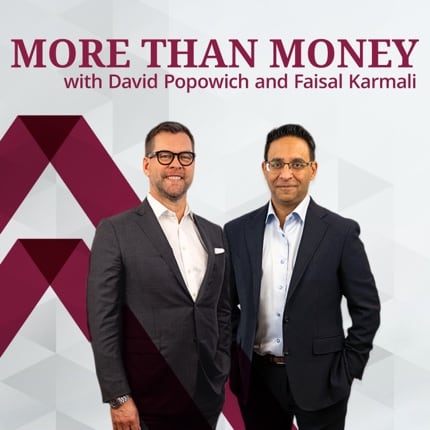Seeing your nest egg shrink is one of the hardest pills to swallow in retirement.
During our working years, we all have the same investment goal: growth. And seeing the value of our portfolios and savings accounts go up gives us a sense of security and maybe even freedom.
But seeing that number go down as you begin to draw on your savings in retirement can be alarming. You may wake up in a cold sweat, worrying about running out of money.
Going through the financial planning process should put your heart and mind at ease. If done properly, a plan looks at the big picture of your finances and ensures you have enough money to support your day-to-day lifestyle in retirement, and hopefully a little extra to start checking those items off your bucket list.
But what about unexpected expenses? The costs that you didn’t see coming and didn’t account for in your financial plan.
A great first step in figuring out how to handle these expenses is having a conversation with your wealth advisor. Here are six things he or she should be asking you:
- What are you using this money for?
Your advisor isn’t asking this question to be nosy. Understanding the context of the withdrawal is an important step in determining how best to come up with the money. A one-off expense, such as a home repair, will require a different approach than a recurring cost.
We recently received a call from a client. In this high interest rate environment, his adult child and her family were struggling to make their mortgage payments on time, and he wanted to help.
In talking to him, we discovered that he wanted to be prepared to help his daughter for the next several months. It wasn’t necessarily just a one-and-done withdrawal. That meant that we needed to revisit his financial plan to ensure that he could support his family without endangering his own financial situation, both now and throughout his retirement.
- What is your timeline for this money?
Your advisor should be asking about the urgency of the need – how fast do you need the money? – but he or she should also be factoring in the time of year.
What do we mean by that?
If you need to make a substantial withdrawal from your investment accounts in June, it is going to be a different conversation than if you need the funds in December. In the middle of the year, you will not yet know the total amount of income that you will make from sources like your job, your pension, and your investments. That lack of visibility limits your options to be tax savvy.
The more information your advisor has, the better able he or she will be to help you make this withdrawal in the most tax-efficient way possible.
- What are the tax implications of this withdrawal?
This is a big one. Most people have different ‘levers’ they can pull when they need money, including savings accounts, non-registered investment accounts, or registered accounts like Registered Retirement Savings Plans (RRSPs), Registered Retirement Income Funds (RRIFs), and Tax Free Savings Accounts (TFSAs). But when it comes to tax, each of these levers is treated differently.
Our client was still a few years away from retirement, and was considering taking the money from his RRSP; however, that withdrawal would trigger a 30% withholding tax and we decided that it was not the most tax-efficient way to get the funds that he needed.
- Do you plan on replacing the money in the future?
This question speaks to your long-term plan. The unexpected cost you’re currently dealing with may seem like the most important thing right now, but you can’t afford to mortgage your future for it.
As advisors, it’s our job to help our client see the bigger picture. What impact would helping his daughter out financially have on other areas of his life? Would it impact his ability to support his lifestyle in retirement?
If he decided to take the money from his TFSA, the withdrawal would be tax-free and could be replaced in the following year. However, taking money from this account could limit his ability to grow his wealth, which could have implications for his retirement down the road.
When clients transfer wealth to their children, it’s in everybody’s best interest to ask one clarifying question: Is this a gift or a loan? It ensures everyone is on the same page regarding expectations and reduces the potential for family drama later on.
Ideally this client’s daughter will be in a position to pay him back one day, but it’s not something he can count on.
As we reviewed his financial plan, we discovered that he could cut his monthly withdrawals from his income bucket in retirement with a negligible impact on his lifestyle. He also revealed that he will receive an inheritance when his elderly mother passes away and can use it to replace the funds.
- What is the emotional impact of this expense?
Advisors are typically numbers people; they make decisions based on the math rather than on emotions. But if your advisors are not asking you how money is emotionally affecting you, they are missing a big piece of the puzzle.
Looking at the client’s situation from a purely mathematical perspective, it might not make financial sense to make a big withdrawal now. While he plans to replace the money eventually, we can’t discount the power of compounding interest. It is especially important in retirement when he will need to balance two important, but competing goals: income and growth. If he takes money out today, the risk is that he will be unable to pay for the expenses that come up in the future.
Helping his daughter was an understandably emotional decision for our client. He was worried about what would happen to her family if they got behind on their mortgage payments. Supporting her financially would help him sleep better at night, even if that means he is able to take less trips than he had planned in retirement or he has less to leave behind for the next generation when he passes away.
- Where should the money come from?
Once you and your advisor have talked through these questions, it’s time to make the final decision: Where should the money come from? There is no one-size-fits-all answer, and each option will likely have its own pros and cons.
We aren’t sharing the story of our client to advocate for one option over the others. We are advocating for the power of the conversation. If you find yourself in a similar situation, sit down with your advisor, review your options, and determine the right solution for you.
David Popowich and Faisal Karmali are Investment Advisors with CIBC Wood Gundy in Calgary. The views of David Popowich and Faisal Karmali do not necessarily reflect those of CIBC World Markets Inc.
This information, including any opinion, is based on various sources believed to be reliable, but its accuracy cannot be guaranteed and is subject to change.












